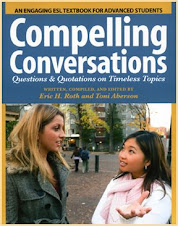Almost everyone agrees that adult ESL teachers should help their English students develop their job skills and practice mock job interviews in our English classes.
During these difficult economic times, however, I would suggest that ESL and even EFL instructors working with college and university students also should focus on practical employment skills. Videotaping practice interviews – and longer is better – remains an invaluable tool.
Yet ESL teachers can also help ESL/EFL students conduct research for possible jobs with information interviews. A common practice in the United States, informational interviews allow job seekers to meet working professionals in their field, collect detailed information on working lives, and expand their network of valuable contacts. Sometimes it also leads to job leads, internships, and even jobs.
More About Informational Interviews on the Web
Vanderbilt University, an elite private university in Tennessee, has compiled an impressive list of 60 informational interviews from a wide variety of disciplines and professions. (Peabody is a leading school of Education within Vanderbilt University). These provide illuminating examples of real-life informational interviews. Note: some speakers have a strong southern accent.
http://streams.peabody.vanderbilt.edu/hod1210/sort_field.htm
Here’s a solid collection of typical informational interview questions from About.com, a fairly reliable New York Times-owned website. Questions are divided into Occupational and Functional categories.
http://jobsearch.about.com/od/infointerviews/a/infointervquest.htm
Here’s a basic video, perhaps targeted for adult education and community college students, that reviews the fundamentals of conducting an informational interview.
http://education-portal.com/videos/Conducting_an_Informational_Interview_Video.html
Naturally, many students hope to find job leads from their informational interviews. ESL students can always use more practice job interviews. This chapter of potential job interview questions and quotations comes from Compelling Conversations that I have used with community college, adult education, and university students.
http://www.compellingconversations.com/pdf/practicing_job_interview.pdf
From my perspective, holding both long mock job interviews and hearing trip reports of information interviews are practical, effective uses of precious classroom time.
Ask more. Know more. Share more.
Create Compelling Conversations.
Visit www.CompellingConversations.com
Sunday, September 27, 2009
Friday, September 18, 2009
What Do Your ESL Students Believe? Find Out!
Why Bring ‘This I Believe’ Essays and Podcasts Into Your English Classroom?
What are your core beliefs? More importantly, what are the core beliefs of your English students? How do you know? Do you like listening to quality radio essays to improve listening skills and critical thinking skills? Are you looking for a friendly way to gently nudge your EFL students into reflecting on their experiences and expressing their ideas?
If so, you might want to consider adding This I Believe radio essays to your curriculum. This I Believe, originally a radio program hosted by legendary journalist Edward R. Murrow in the 1950s, has been resurrected by National Public Radio as a weekly feature.
While the 1950s version sought out short personal essays by leading intellectuals, artists, and prominent personalities, the 21st century version is far more democratic. Anybody can submit an essay – and thousands and thousands of individuals around the world – have.
English teachers and global travelers might appreciate the sample podcast This I Believe: Inviting the World to Dinner by travel writer and Parisian resident Jim Haynes. Students might also appreciate the open spirit and generosity, but if not, they can choose from over 200 other radio essays. In short, The This I Believe website includes a tremendous amount of free resources for teachers and students. Teachers can sign up for the free mailing list and download an exceptional discussion guide. Amazon also sells several collections of This I Believe essays from both the modern version (with audio) and the original collections from over 50 years ago.
Why don’t you try it in your English class? Here is a simple reproducible homework worksheet that allows English students to find, summarize, and share their own favorite podcasts. I usually have students “introduce” their choice in both small groups and before the entire class. After students have listened to several “this I believe” radio essays, they feel more comfortable writing their essay and presenting it before the class for a final project.
So far, my intermediate and advanced students have both enjoyed the assignment and produced original, reflective work. The flexible format also means that English teachers can modify it to meet student or course requirements. Writing instructors can ask for essays; speech instructors can require a speech. Yet students get an often rare chance to hear intelligent voices reveal their personal philosophies in an engaging manner. Further, our students get to speak their minds and share their insights in our strange, wonderful language. I believe that makes a compelling English class too!
As Mr. Murrow would say, “good night and good luck.”
-------------------------------------------------------------------------------
This I Believe Homework Worksheet
Links: This I Believe
http://www.npr.org/templates/story/story.php?storyId=4538138
Please select one radio segment, based on a personal essay, and read by writers. Find a story that resonates with you. Listen carefully. Take notes. Fill out the worksheet below. You will be asked to share your selection with classmates in both a small group and the entire class.
Student:
This I Believe Title:
Author/Reader:
Length:
Who is the author?
What’s the main idea?
Why did you choose this podcast?
Did you hear any new words or phrases?
1.
2.
3.
Who do you imagine is the audience for this podcast? Why?
What is your reaction? Why?
-------------------------------------------------------------------------------------
Ask more. Know more. Share more.
Create Compelling Conversations.
Visit www.CompellingConversations.com
What are your core beliefs? More importantly, what are the core beliefs of your English students? How do you know? Do you like listening to quality radio essays to improve listening skills and critical thinking skills? Are you looking for a friendly way to gently nudge your EFL students into reflecting on their experiences and expressing their ideas?
If so, you might want to consider adding This I Believe radio essays to your curriculum. This I Believe, originally a radio program hosted by legendary journalist Edward R. Murrow in the 1950s, has been resurrected by National Public Radio as a weekly feature.
While the 1950s version sought out short personal essays by leading intellectuals, artists, and prominent personalities, the 21st century version is far more democratic. Anybody can submit an essay – and thousands and thousands of individuals around the world – have.
English teachers and global travelers might appreciate the sample podcast This I Believe: Inviting the World to Dinner by travel writer and Parisian resident Jim Haynes. Students might also appreciate the open spirit and generosity, but if not, they can choose from over 200 other radio essays. In short, The This I Believe website includes a tremendous amount of free resources for teachers and students. Teachers can sign up for the free mailing list and download an exceptional discussion guide. Amazon also sells several collections of This I Believe essays from both the modern version (with audio) and the original collections from over 50 years ago.
Why don’t you try it in your English class? Here is a simple reproducible homework worksheet that allows English students to find, summarize, and share their own favorite podcasts. I usually have students “introduce” their choice in both small groups and before the entire class. After students have listened to several “this I believe” radio essays, they feel more comfortable writing their essay and presenting it before the class for a final project.
So far, my intermediate and advanced students have both enjoyed the assignment and produced original, reflective work. The flexible format also means that English teachers can modify it to meet student or course requirements. Writing instructors can ask for essays; speech instructors can require a speech. Yet students get an often rare chance to hear intelligent voices reveal their personal philosophies in an engaging manner. Further, our students get to speak their minds and share their insights in our strange, wonderful language. I believe that makes a compelling English class too!
As Mr. Murrow would say, “good night and good luck.”
-------------------------------------------------------------------------------
This I Believe Homework Worksheet
Links: This I Believe
http://www.npr.org/templates/story/story.php?storyId=4538138
Please select one radio segment, based on a personal essay, and read by writers. Find a story that resonates with you. Listen carefully. Take notes. Fill out the worksheet below. You will be asked to share your selection with classmates in both a small group and the entire class.
Student:
This I Believe Title:
Author/Reader:
Length:
Who is the author?
What’s the main idea?
Why did you choose this podcast?
Did you hear any new words or phrases?
1.
2.
3.
Who do you imagine is the audience for this podcast? Why?
What is your reaction? Why?
-------------------------------------------------------------------------------------
Ask more. Know more. Share more.
Create Compelling Conversations.
Visit www.CompellingConversations.com
Wednesday, September 2, 2009
Starting, and Building, a Compelling Conversation
How do start and build a satisfying conversation?
There are a million ways, but here's a simple slogan.
Ask more. Know more. Share more.
You can create compelling conversations by asking simple, yet deep, questions like:
Create Compelling Conversations.
Visit www.CompellingConversations.com
There are a million ways, but here's a simple slogan.
Ask more. Know more. Share more.
You can create compelling conversations by asking simple, yet deep, questions like:
|
|
“Colors fade, temples crumble, empires fall, but wise words endure.”
- Edward Thorndike (1874-1949), American psychologist
Create Compelling Conversations.
Visit www.CompellingConversations.com
Subscribe to:
Posts (Atom)





